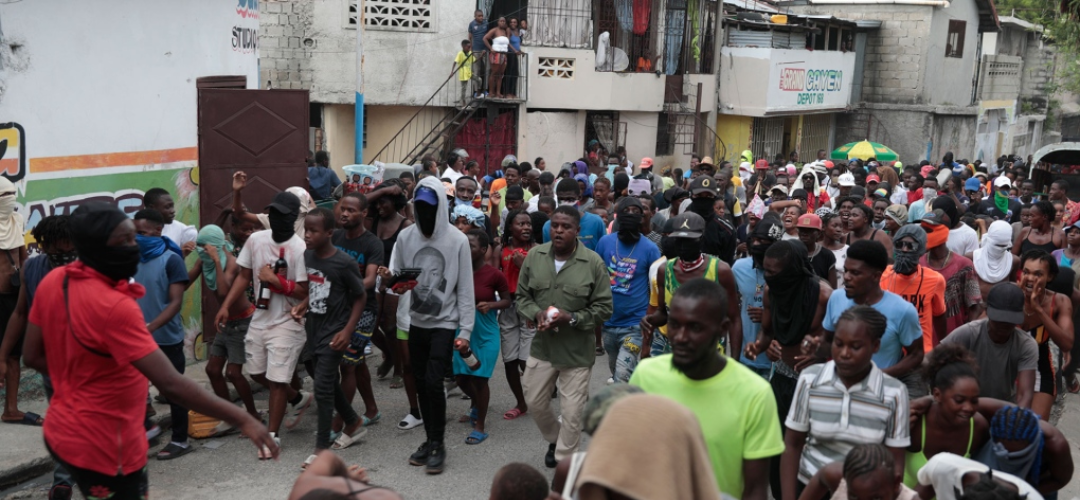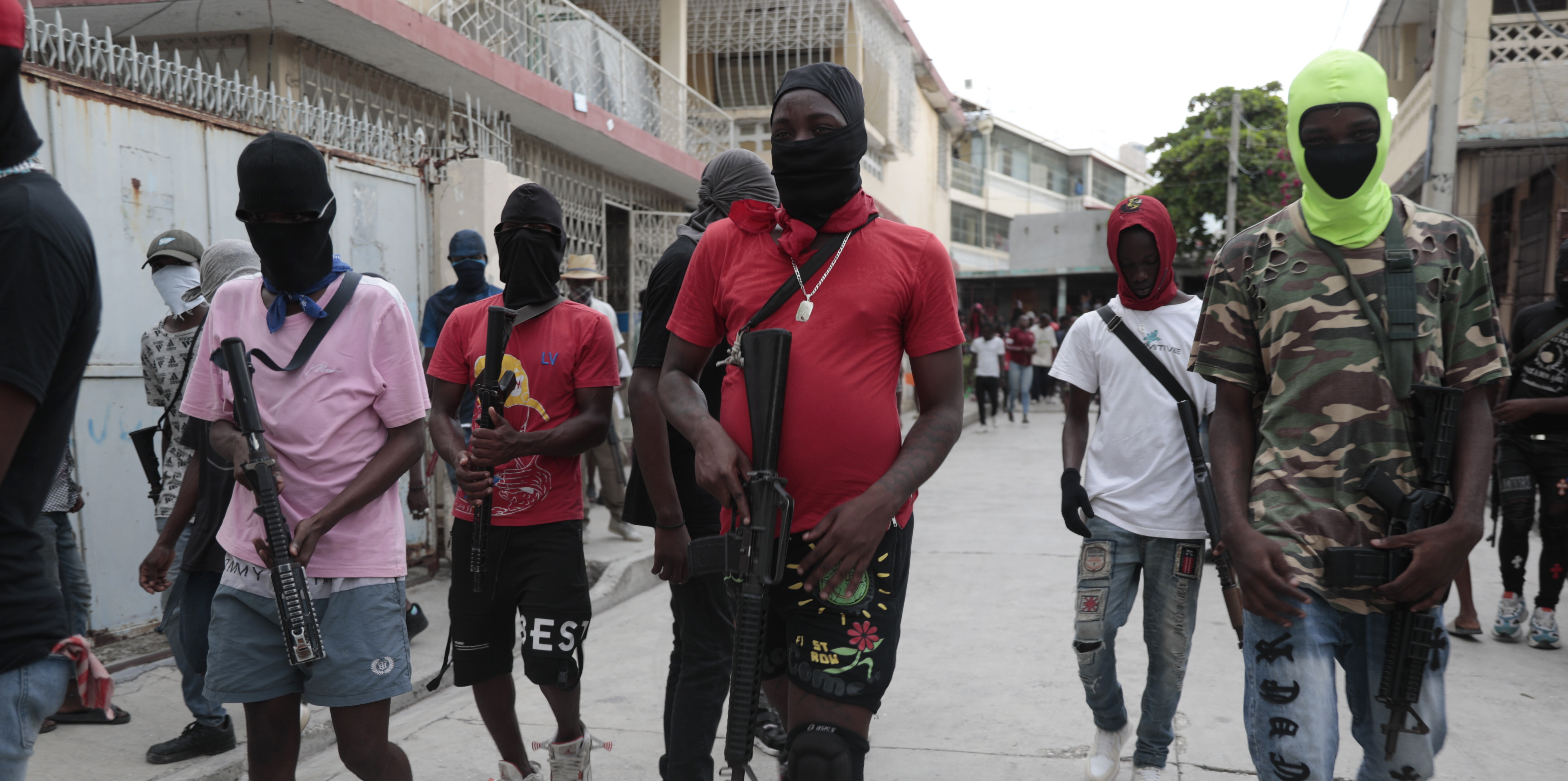Haiti: Gangland Kingdom!
September 23, 2023 | Expert Insights

Haiti is a small island nation in the Caribbean Sea. It is the poorest country in the Western Hemisphere and has a long political instability and violence history. The country has recently been plagued by gang violence, corruption, and natural disasters.
Haiti is facing a humanitarian crisis of unprecedented proportions. Millions of Haitians need food, water, and shelter. Gang violence is out of control, with gangs taking control of large parts of the country and committing widespread killings, kidnappings, and extortion. The Haitian government is weak and ineffective and cannot provide basic services to its citizens or protect them from violence.
According to the Global Initiative Against Transnational Organised Crime, no less than 200 gangs hold sway over this tiny island. The UN claims that over 60 per cent of the capital is entirely in control of the gangs, which control half of the political institutions and operate as a de facto government. Armed with sophisticated weapons, gang members rule the streets both by night and day. One year back, the UN Security Council imposed sanctions on the gang leaders and their financers and demanded the deployment of a 'specialised police force.' Apparently, all these measures have had little impact on the worsening situation.
Background
Haiti is no stranger to calamities, natural or man-made. There was a devastating earthquake in 2010 followed by a cholera epidemic, which was blamed on UN peacekeepers from Nepal. In 2021, an earthquake measuring 7.2 magnitude killed nearly 2,000 citizens, leaving thousands more injured and homeless. Within three days, a severe tropical depression struck the country, bringing flash floods and mudslides, adding to the rising death toll. The UN had to conduct two peacekeeping missions in Haiti, the first between 1993 and 1996 to settle the country after a military rebellion and again between 2004 and 2017 to restore a secure and stable environment, promote the political process, strengthen Haiti’s government institutions and rule-of-law structures, and protect human rights.
Haiti has been plagued by gang violence for decades, but since the assassination of President Jovenel Mose in July 2021, it has escalated substantially. Currently, between 150 and 200 gangs control the majority of Port-au-Prince, vital infrastructure, and critical roads within the capital.
According to the United Nations, between January 1 and August 15, over 2,400 people were murdered, and nearly 1,000 were kidnapped in the first half of this year. Sexual assaults against women and children occur repeatedly. The violence displaced over two hundred thousand people, and its reach extends beyond the capital.
In October of the previous year, Haiti's de facto prime minister, Ariel Henry, initially advocated for foreign armed intervention. This demand was supported by the United States, which expressed a desire to restore security to facilitate future elections. However, the United States was hesitant to lead the mission, possibly due to historical interference and support for past oppressive regimes by both the United States and former colonial power France.
Recent developments have increased the likelihood of international intervention in Haiti to combat the ubiquitous gang violence. Kenya has dispatched a delegation to Port-au-Prince to assess the viability of leading a UN-supported security mission, and support from the United States, prominent UN officials, and Caribbean nations is expanding.
Numerous questions remain unresolved about any future UN mission, such as the mission's specific mandate, the nation's contributing personnel, and the mission's duration. There are rumours that a draft of a UN resolution authorising the mission is in the works, with reports indicating a vote by the UN Security Council soon. Beginning in August, Kenya unexpectedly offered to lead the mission and committed to deploying 1,000 police officers to combat the gangs, resulting in a change in circumstances. Shortly thereafter, Jamaica and the Bahamas also pledged personnel.

Analysis
The Haitian government is weak and ineffective and cannot provide basic services to its citizens or protect them from violence. In this context, there have been calls for foreign intervention in Haiti to restore order and stability.
There are several arguments in favour of foreign intervention in Haiti. First, the country is facing a serious humanitarian crisis. Millions of Haitians need food, water, and shelter. Second, the gang violence in Haiti is out of control, and the complete law enforcement structure has collapsed. The government is only in name, unable to provide basic services to its citizens or to protect them from violence.
Others advise prudence from their experience of past external interventions, which did not work, and hence, it should be left to the Haitian people to find a lasting solution to their problems. Unfortunately, the history of foreign intervention in Haiti is not good. The U.S. occupation of Haiti in the early 20th century was a disaster, leaving a legacy of resentment and mistrust.
Haitians are wary of foreign interference, which has historically had negative consequences. Some view this intervention as a means of bolstering a corrupt elite, as opposed to confronting the violence and improving the dire humanitarian situation.
Opposition to foreign intervention in Haiti centres on two central concerns. Is Haiti prepared for another foreign intervention, especially after the controversial "stabilisation" mission of the United Nations, MINUSTAH, departed in 2017? And even if intervention is necessary, is Kenya the right country to lead it?
There were allegations of sexual abuse, violence against civilians, and a devastating cholera outbreak attributed to Nepalese peacekeepers during MINUSTAH's 13-year presence. This history casts doubt on the feasibility of international intervention in Haiti.
In an open letter to the UN Security Council, the UN representative of Amnesty International expressed concern over Kenya's police force, citing the "continued unlawful use of force against protesters." They stressed the importance of reviewing the human rights records of any force before deployment.
Many have questioned the efficacy of a Kenyan-led force that cannot communicate in French or Kreyol due to language and cultural barriers. Some are concerned about the potential for cultural clashes and worldview differences between Kenya and Haiti.
However, William O'Neill, the UN's independent human rights expert for Haiti, who has advocated for foreign intervention, downplayed some of these concerns. He noted that many senior Haitian police officers are fluent in English, suggesting that the Haitian National Police should negotiate with the criminals. O'Neill emphasised the significance of a mission with specialised teams, vetted officers, and an emphasis on minimising civilian casualties.
U.S. officials have proposed a non-UN multinational force to support the overwhelmed Haitian police in tackling criminals and protecting critical infrastructure. Ambassador George Orina, head of the Kenyan delegation, believes Haiti requires an offensive operational force to combat the gang problem, although this has not been substantiated.
The Ministry of Communication of Haiti stated that the force would not supplant the National Police but rather make it more efficient and mission-capable. According to the United Nations, despite the fact that more than 14,000 Haitian police officers are on record, only 3,300 are on public protection duty. Dozens of officers have been murdered or abducted, and gangs have torched and abandoned several police stations.
As a consequence of the weakened Haitian police and the collapse of the state, vigilante groups known in Kreyol as "Bwa Kale" have emerged to combat neighbourhood violence. Recent events, such as a deadly clash between a local pastor-led march and gangs in Canaan, demonstrate the formidable challenges confronting the Haitian police and any international deployment.
Assessment
- Haiti represents the perfect example of a nation collapsing when the rule of law and state institutions no longer exist, even when it is located at the door step of powerful nations like the U.S. The larger moral question is whether the international community should again step in to restore some sort of order, however imperfect, or allow the uninterrupted bloodshed and rapine to continue.
- True, 70% of Haitians have been polled to oppose foreign intervention. How accurate are these polls, and what alternative do these people have to offer to make their country a functional state once again? If there are no clear-cut answers, then perhaps the international community under the aegis has to take the initiative and step in with authority and force. After all, even in the Congo, the UN has been engaged for more than two decades in trying to prevent anarchy and massacre of masses, albeit with only limited success.
- It is also important to observe that there is no international consensus about foreign intervention. Several nations, including the United States, support international intervention in Haiti. Other nations, including Canada, are more sceptical. Whether or not to intervene in Haiti is ultimately complex, but a decision must be taken sooner than later to save lives.








Comments